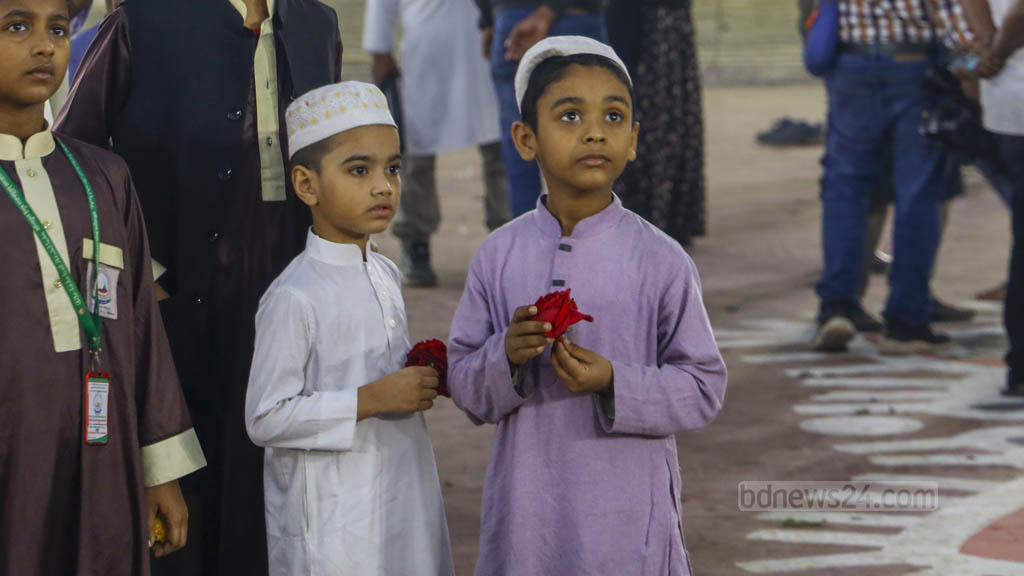Home
+
After sunrise, a barefoot morning procession began at the Shaheed Minar as the song “Amar Bhaiyer Rokte Rangano Ekushey February” rang out

Published : 21 Feb 2025, 10:11 AM
Clad in mourning black and holding flowers for tribute, rows and rows of barefoot people have converged at Dhaka’s Central Shaheed Minar to pay their respects to those martyrs who gave their lives for the recognition of Bengali as a state language.
On their lips were the words to the song that always marks International Mother Language Day – “Amar Bhaiyer Rokto Rangano Ekushey February, Ami Ki Bhulite Pari?”
This year, the 73rd anniversary of the first major resistance of Bengalis against Pakistani rule, comes after students and members of the public overcame a bloody uprising to dream of forming a new Bangladesh.

The mass uprising of July and August also centred on the Central Shaheed Minar in the capital. On Friday, the programmes observing a day of both pride and mourning, began with tributes in the wee hours.
President Mohammed Shahabuddin and Chief Advisor Muhammad Yunus were the first to pay their respects, placing flowers at the memorial to the martyrs of the language movement at the Central Shaheed Minar.
After placing their wreaths, the president and chief advisor observed a moment of silence for the departed martyrs.

Banners had been strung up on some walls, bearing the slogans, songs, and poetry that marked Feb 21 in the hearts of the nation.
After the VIPs presented their wreaths, representatives from political, cultural, and social organisations began coming to the Shaheed Minar from 12:40am to pay their respects.
Despite this, the Shaheed Minar area remained largely silent from 2am until sunrise. Then, as the sun came over the horizon, a barefoot procession began at the monument as the “Amar Bhaiyer Rokte Rangano Ekushey February” rang through the air.
After 7am, people from all walks of life began to make their way to the memorial to honour the Language Movement. As the day grows, so do the lines of people flocking to the monument. People of all ages, classes, and creeds waited in line with flowers and small flags.

Children could be seen accompanying their parents and guardians.
Following the political upheaval in July and August, a different atmosphere prevails on Thursday. The imprint of the uprising can be seen in the tributes adorning the walls in the area.
Since 2002, Bangladesh has not marked Feb 21 alone.
That year, the United Nations General Assembly recognised the day as International Mother Language Day. Now, the world marks Feb 21 "to promote the preservation and protection of all languages used by people of the world" as their tribute to the martyrs of Bangladesh’s Language Movement.
A DAY DRENCHED IN BLOOD
On that fateful day in 1952, the activists of the Language Movement had three demands – for Bengali to be recognised as the state language, the release of all political prisoners, and the introduction of Bengali at all levels.
On Feb 21, 1952, the East Bengal Management Council held a budget session. A strike was called that day.
To try and curtail the strike, the administration imposed a curfew under Section 144 on Dhaka University and its surrounding areas. The brave sons of Bengal broke the curfew that day and held a procession demanding the official recognition of Bengali. At the orders of the Pakistani ruling class, the police opened fire on the protesters.
That very day, poet Mahbub Ul Alam Chowdhury, a convener of the State Language Struggle Committee of Chattogram, wrote a poet to protest the killing of students by the police.
In it, he demanded the death penalty for those who ordered the killings and on those who wanted to banish Bengali as the nation’s mother tongue.
It was the first poem written about Feb 21.

Abdul Gaffar Chowdhury, a student of Dhaka College at the time, went to visit injured students at Dhaka Medical College. In the outpatient department, he found the body of language activist Rafiq. Upon seeing the mangled body, he composed the poem “Amar Bhaiyer Rokte Rangano Ekushey February”. The poem was later set to music, first by Abdul Latif and later Altaf Mahmud. It has become a cornerstone of Feb 21 memorials.
Unable to suppress the Language Movement, the Pakistani ruling class eventually recognised Bengali as one of the state languages. But the effects of the movement would continue to be felt in the Bengali struggle for independence, which culminated in the Liberation War of 1971.
Today, the day is celebrated worldwide as not only a day to protect the rights of Bengali speakers, but also every person’s right to speak their own language. The spirit of the indomitable movement inspires people across the globe to protect their own language and culture.
Bangladesh observes the occasion as a public holiday. In memory of the language martyrs, the national flag will be flown at half-mast.
A ceremony will be held at the UN headquarters in New York to mark International Mother Language Day. A corresponding ceremony will also be held at the Bangladesh Mission to the UN.